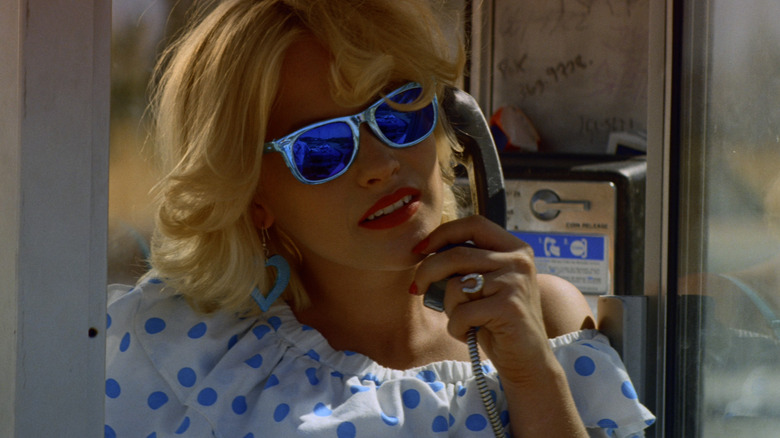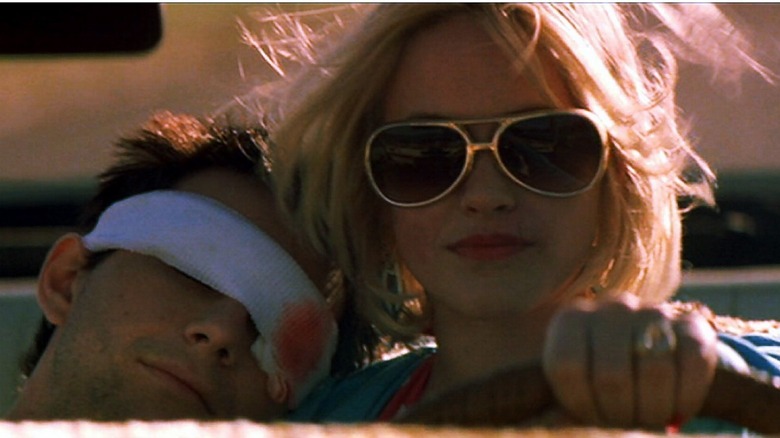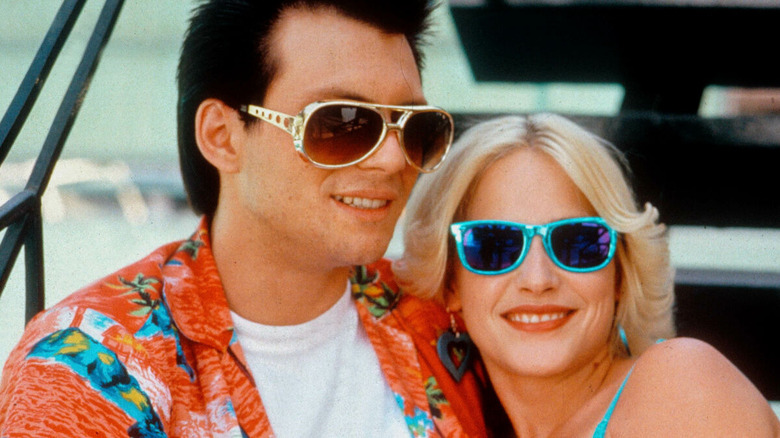How Tony Scott And Quentin Tarantino's True Romance Endings Differ
Everyone has their own idea of what's romantic, and that applies to movie endings, too. As the screenwriter of the 1993 film "True Romance," Quentin Tarantino liked the idea of tragic romance, which has been a pretty consistent thread throughout his career. (Name one non-tragic Tarantino romance. I'll wait.) The director of "True Romance," Tony Scott, saw things a bit differently, and wanted to give this violent, dramatic romantic tale a happy ending. In an interview with IndieWire back in 2012, Tarantino reminisced about the original ending that he wrote into the script for runaway lovers Clarence (Christian Slater) and Alabama (Patricia Arquette), and explained his theory on why exactly Scott and uncredited script co-writer Roger Avary changed it.
"True Romance" is one of my favorite movies, a gritty and bloody romance between a nerdy cinephile who works in a comic book store and the brand-new working girl who falls in love with him while turning her very first trick. It's ridiculously sweet, in theory, though Clarence also kills Alabama's pimp (played by an absolutely unhinged Gary Oldman) and steal a briefcase full of cocaine that belongs to the mafia. This may be no "When Harry Met Sally," but for certain kinds of film fans, it's the ultimate swoon-worthy love story.
A romantic tragedy worthy of Tarantino
According to the interview, Scott and Avary (who famously co-wrote "Pulp Fiction" with Tarantino) made Tarantino's segmented script more linear and totally changed the ending, which would have seen Clarence get his head blown off during the climactic final shootout. Instead, Clarence just loses an eye and is taken to safety by Alabama, and the final scene depicts the two of them playing on a beach with their child. It's as happy an ending you can get in a film about facing off against the mafia and running away from peeved pimps, and turns the story into something of a crime film fairy tale. Apparently Scott just really fell in love with the characters so much that he couldn't handle the idea of either of them dying after everything they had faced. Tarantino explained:
"I wanted to make you fall in love with Clarence and blow his f***ing head off, I wanted to do that to you. Tony didn't want to do that. Clarence was me, I could blow my own head off, a punk rock move."
While Clarence is clearly a Tarantino stand-in, he also picked up a little bit of sweetness along the way. Whether that came entirely from Slater's performance or Scott's direction is anyone's guess, but it would be truly heartbreaking to kill the excitable, romantic nerd after everything he did to try and give Alabama a new life. While Tarantino's ending might have been more "punk rock," it doesn't really tonally fit in with the rest of the film, which posits their romance as the one thing that can conquer all. This isn't "Romeo and Juliet," after all. Romance is supposed to win.
A bit of sweet sentimentality from Scott
Tarantino went on to imitate the late Scott, lovingly using his way of phrasing things to give his version of why he couldn't film the original ending:
"Let's just fall in love with them and stay there...I'm not doing it to be a commercial f***. I'm doing it because I love these f***ing kids, they f***ing deserve it. I can't f***ing kill them."
That Tarantino truly has a way with vulgarity, though he's not wrong. Scott likely wanted to give his heroes a chance to enjoy their hard-earned freedom together, and Clarence dying would be a punishment to both the characters and viewers who had fallen in love with him. If serial murderers Mickey and Mallory from the Tarantino-penned "Natural Born Killers" get to live happily ever after, then why not two goofy kids who got in way over their heads? It's not a "commercial" ending just because it's a happy one, especially when it feels so deeply earned.


